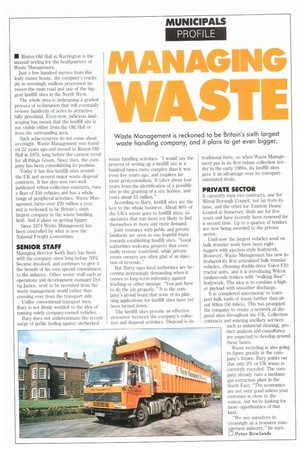MANAGIN04
Page 44

If you've noticed an error in this article please click here to report it so we can fix it.
Waste Management is reckoned to be Britain's sixth largest waste handling company, and it plans to get even bigger.
• Rixton Old Hall in Warrington is the unusual setting for the headquarters of Waste Management.
Just a few hundred metres from this leafy manor house, the company's trucks ply in seemingly endless procession between the main road and one of the biggest landfill sites in the North West.
The whole area is undergoing a gradual process of reclamation that will eventually restore hundreds of acres to attractive hilly grassland. Even now, judicious landscaping has meant that the landfill site is not visible either from the Old Hall or from the surrounding area.
Such achievements do not come about overnight. Waste Management was founded 22 years ago and moved to Rixton Old Hall in 1979, long before the current trend for all things Green. Since then, the company has been consolidating its position.
Today it has five landfill sites around the UK and several major waste disposal contracts. It has also won two wellpublicised refuse-collection contracts, runs a fleet of 450 vehicles and has a whole range of peripheral activities. Waste Management turns over £20 million a year, and is reckoned to be Britain's sixth largest company in the waste handling field. And it plans on getting bigger.
Since 1974 Waste Management has been controlled by what is now the National Freight Consortium.
SENIOR STAFF
Managing director Keith Bury has been with the company since long before NFC became involved, and continues to give it the benefit of his own special commitment to the industry. Other senior staff such as operations and development manager Dyfrig James, tend to be recruited from the waste management world rather than crossing over from the transport side.
Unlike conventional transport men, Bury is not firmly wedded to the idea of running solely company-owned vehicles.
Bury does not underestimate the recent surge of public feeling against unchecked waste handling activities. "I would say the process of setting up a landfill site is a hundred times more complex than it was even five years ago, and requires far more professionalism. It takes about four years from the identification of a possible site to the granting of a site licence, and costs about £1 million."
According to Bury, landfill sites are the key to the whole business. About 80% of the UK's waste goes to landfill sites, so operators that run them are likely to find themselves in more and more demand.
Joint ventures with public and private landlords are seen as one hopeful route towards establishing landfill sites. "Local authorities welcome projects that eventually restore wasteland, while private estate owners are often glad of an injection of revenue."
But Barry says local authorities are becoming increasingly demanding when it comes to long-term indemnity against leaching or other damage. "You just have to do the job properly." It is the company's proud boast that none of its planning applications for landfill sites have yet been turned down.
The landfill sites provide an effective crossover between the company's collection and disposal activities. Disposal is its traditional forte, so when Waste Management put in its first refuse collection tender in the early 1980s, its landfill sites gave it an advantage over its transportorientated rivals.
PRIVATE SECTOR
It currently runs two contracts, one for Wirral Borough Council, not far from its base, and the other for Taunton Deane Council in Somerset. Both are for five years and have recently been renewed for a second time. Up to a quarter of tenders are now being awarded to the private sector.
Until now the largest vehicles used on bulk transfer work have been eightleggers with ejection-style bodywork. However, Waste Management has now introduced its first articulated bulk transfer vehicles, choosing double-drive Volvo F10 tractor units, and it is introducing Wilcox tandem-axle trailers with "walking floor" bodywork. The idea is to combine a higher payload with smoother discharge.
It is considered uneconomic to transport bulk loads of waste further than about 80km (50 miles). This has prompted the company to create a network of disposal sites throughout the UK. Collection contracts and existing ancillary services such as industrial cleaning, product analysis and consultancy are expected to develop around these bases.
Waste recycling is also going to figure greatly in the company's future. Bury points out that only 2% of UK waste is currently recycled. The company already runs a methane gas extraction plant in the South East: "The economics are not very good unless your customer is close to the source, but we're looking for more opportunities of that kind.
"We see ourselves increasingly as a resource management industry," he says. 0 Peter Rowlands








































































































